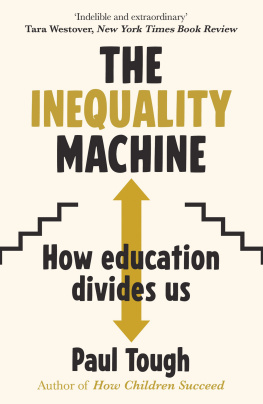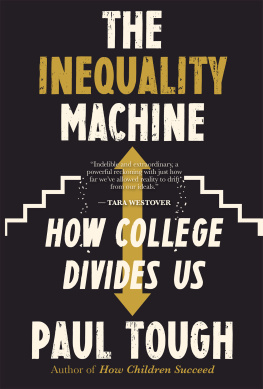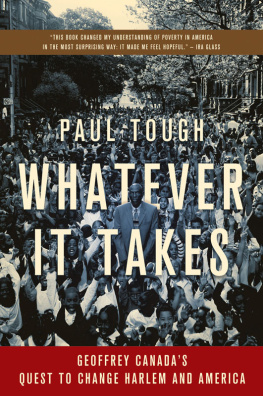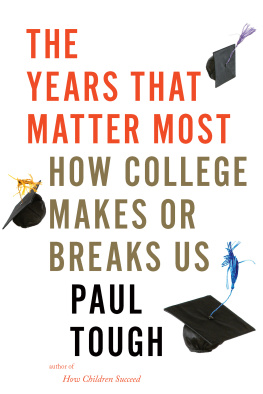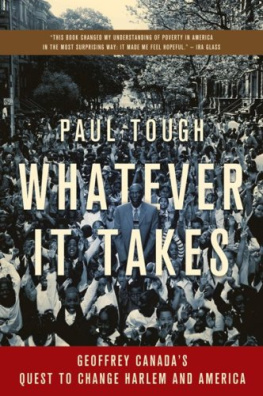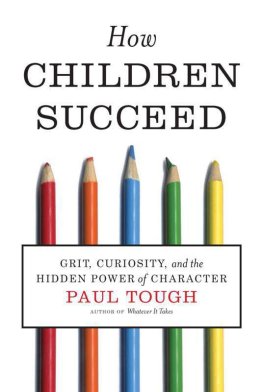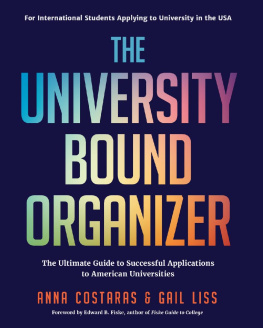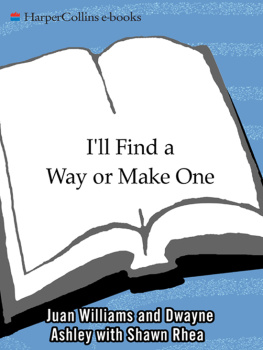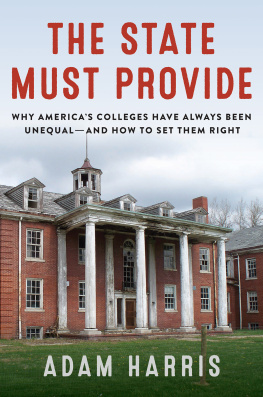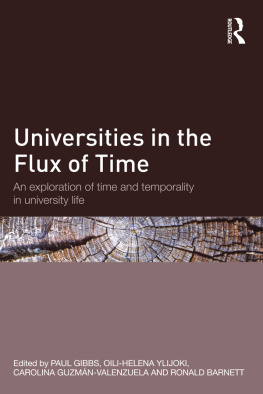Paul Tough
THE INEQUALITY MACHINE
How Education Divides Us

Praise for The Inequality Machine
A readable kiss-and-tell study Tough finds that higher education, which has the potential to increase upward mobility, has become an obstacle that perpetuates social rigidity. The poor remain poor and the rich get richer This study is laced with deep anger. Times Higher Education
An excellent new book on college. The Atlantic
Tough writes movingly about students who are trying to navigate the confounding, expensive, and intimidating process of getting into and staying in college. Wired
Important Among his books many vital contributions are its portraits of schools and programs that model a better way. New York Times
Paul Tough is a beautiful reporter and writer and a deeply moral guide to understanding the situation of children in our heartless meritocracy A great book that should start a necessary conversation. George Packer, author of The Unwinding
Excellent Shows how the highly touted efforts of universities to increase diversity and reach out to students from low-income backgrounds have, in many cases, not made any discernible progress toward those goals. Los Angeles Times
A powerful reckoning with just how far weve allowed reality to drift from our ideals. Tara Westover, author of Educated, New York Times Book Review
Toughs analyses of data are sound, his portraits of students and teachers sympathetic, his argument neatly structured, and his topic one with wide appeal. This well-written and persuasive book is likely to make a splash. Publishers Weekly
A stunning piece of work A completely absorbing narrative with some very surprising, trenchant analysis A devastating report card on the American dream. Its just a very special book. Michael Pollan, author of How to Change Your Mind
A deeply reported and damning portrait of fraying American social mobility A clear-eyed portrait of what a stacked game it really is. Quartz
Ive been begging everyone I know to read this book Its an utterly absorbing, utterly enlightening, utterly important book about classism in American higher education and the myth of meritocracy. Cheryl Strayed, author of Wild, New York Times Book Review
Tough clearly shows that college placement remains mostly about wealth at the expense of a collective educational environment. A good choice for aspiring college students and their parents. Kirkus
Gorgeously reported. Vividly written. Utterly lucid The way he tells the stories of these students, its impossible not to care about them and get angry on their behalf. Ira Gloss, host of This American Life
Toughs urgent account combines cogent data and artful storytelling to show how higher education has veered from its meritocratic ideals to exacerbate societys inequality. Editors Choice, New York Times Book Review
A powerful reckoning with just how far weve allowed reality to drift from our ideals. Tara Westover, author of Educated, New York Times Book Review
Toughs analyses of data are sound, his portraits of students and teachers sympathetic, his argument neatly structured, and his topic one with wide appeal. This well-written and persuasive book is likely to make a splash. Publishers Weekly
A stunning piece of work A completely absorbing narrative with some very surprising, trenchant analysis A devastating report card on the American dream. Its just a very special book. Michael Pollan, author of How to Change Your Mind
A deeply reported and damning portrait of fraying American social mobility A clear-eyed portrait of what a stacked game it really is. Quartz
Ive been begging everyone I know to read this book Its an utterly absorbing, utterly enlightening, utterly important book about classism in American higher education and the myth of meritocracy. Cheryl Strayed, author of Wild, New York Times Book Review
Tough clearly shows that college placement remains mostly about wealth at the expense of a collective educational environment. A good choice for aspiring college students and their parents. Kirkus
Gorgeously reported. Vividly written. Utterly lucid The way he tells the stories of these students, its impossible not to care about them and get angry on their behalf. Ira Gloss, host of This American Life
Toughs urgent account combines cogent data and artful storytelling to show how higher education has veered from its meritocratic ideals to exacerbate societys inequality. Editors Choice, New York Times Book Review
About the Author
Paul Toughs previous book, How Children Succeed, spent more than a year on the New York Times hardcover bestseller list and was translated into 27 languages. He is a contributing writer to the New York Times Magazine and a regular contributor to the NPR programme This American Life. He lives in Austin, Texas.
Also by Paul Tough
Whatever It Takes: Geoffrey Canadas Quest to Change Harlem and America
How Children Succeed: Grit, Curiosity, and the Hidden Power of Character
Helping Children Succeed: What Works and Why
CORNERSTONE
UK | USA | Canada | Ireland | Australia
New Zealand | India | South Africa
Cornerstone is part of the Penguin Random House group of companies whose addresses can be found at global.penguinrandomhouse.com.

First published in the United States by Houghton Mifflin Harcourt in 2019
First published in the United Kingdom by Random House Books in 2019
This paperback edition first published by Arrow Books in 2021
Originally published as The Years That Matter Most
Copyright Paul Tough 2019
The moral right of the author has been asserted
Cover art and design Rodrigo Corral
Part of originally appeared, in different form, in Who Gets to Graduate?, written by the author and published in May 2014 by the New York Times Magazine. Text reprinted by permission of the author. All rights reserved.
Excerpts from The Privileged Poor: How Elite Colleges Are Failing Disadvantaged Students, by Anthony Abraham Jack. Copyright 2019 by Anthony Abraham Jack. Reprinted by permission of Harvard University Press. All rights reserved.
ISBN: 978-1-473-58914-8
This ebook is copyright material and must not be copied, reproduced, transferred, distributed, leased, licensed or publicly performed or used in any way except as specifically permitted in writing by the publishers, as allowed under the terms and conditions under which it was purchased or as strictly permitted by applicable copyright law. Any unauthorized distribution or use of this text may be a direct infringement of the authors and publishers rights and those responsible may be liable in law accordingly.
For Paula
Preface to the Paperback Edition
WHEN I STARTED working on this book, way back in 2013, I imagined that my reporting would follow the general pattern of my previous books, Whatever It Takes, How Children Succeed, and Helping Children Succeed. Those books were about the obstacles that impeded the path of children growing up in low-income homes and neighborhoods and the strategies some educators and scientists were using to steer children past those obstacles. Much of the pleasure in reporting those books came from spending extended time with community leaders, pediatricians, economists, and chess teachers as they tried out new strategies and philosophies to help children succeed.

